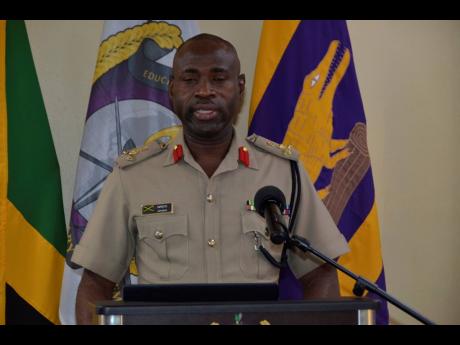Editorial | New prison urgent, Brigadier
The new head of Jamaica’s correctional services, Brigadier Radgh Mason, stressed three things about his intended approach to the job.
One is that he is a stickler for discipline. Second, he relentlessly pursues strategic objectives. Finally, his mandate is to be transformative.
This newspaper, on its face, has no cause to question any of these objectives, except that we would appreciate better particularly on what Brigadier Mason intends to transform, and suggest one where the need for improvement is fundamental and urgent, which he must relentlessly impress upon the government. That is, the physical state of the island’s prisons.
Mending and patching won’t suffice any longer. The contrary to this, we hope, is not what the commissioner of corrections intended to imply with his remark that even in rich countries’ institutions don’t have all that they need.
On the matter of discipline and holding people accountable, The Gleaner hopes that Brigadier Mason – the latest in the line of army officers to lead the Department of Correctional Services – can get to the bottom of what may have broken down in the system to seemingly allow recording studio(s) to operate within Jamaica’s prisons and, apparently, for some inmates to live preferred lifestyles, with easy access to banned luxury goods.
There are also complaints from prisoners and reform campaigners, notwithstanding the improvements of recent years, of an insufficiency of rehabilitation programmes for inmates.
BROADLY SATISFIED
Yet, it appears that Brigadier Mason, who formally assumed the job only at the start of this month, is broadly satisfied with what he has seen at the DCS, especially with respect to the competence of the staff. On that basis, there is a foundation upon which to erect the transformation of the system.
“The transformation means looking at our policies and making sure that they are in line with the strategic directives that we are charged with delivering,” he said.
Brigadier Mason and the national security minister, Horace Chang, must, between them, publicly declare what the strategic objectives are and the timeframes for their delivery. That is critical information, necessary for the monitoring of performance.
Whatever else may be in that package, a priority must be the construction of a modern, maximum security prison, which has been on Jamaica’s agenda for too many decades, with too little action.
How a country treats its criminal offenders, including finding the right balance between punishment and rehabilitation, reveals much about the conscience of that society and willingness to rescue those of its members who fall over the precipice.
There are 10 correctional facilities in Jamaica, housing over 3,700 inmates. None is in great shape. The best known of the prisons are Tower Street in Kingston, and the one at Spanish Town, St Catherine.
Both are old red brick structures, built, in the case of Spanish Town, 370 years ago, and Tower Street, 179 years ago. Between them, they house over 70 per cent of the inmates, and both are badly overcrowded – in the case of Spanish Town by over 40 per cent, and Tower Street, close to one-and-half times.
LITTLE SCOPE
Facilities at the centres are not vastly improved than when they were built and they have little scope for further upgrading. For several decades anti-crime reformers and human rights campaigners, including from the United Nations, have lamented the decrepit unacceptable state of the prisons in a modern society, which contributed to Jamaica’s high rate of recidivism – over 42 per cent.
The situation grew worse after an earthquake last October further weakened the structures, causing government engineers to warn that compromised sections of the Tower Street and Spanish Town facilities posed “immediate danger to inmates and staff”.
The current administration rebuffed a proposal by Britain – which was being entertained by the previous government – to help finance a state-of-art prison in the island, in exchange for housing Jamaican inmates in British jails who were near the end of their terms.
Jamaica has not yet been able to muster the resources to, on its own, build a prison. The government, however, has in hand a proposal from private investors to build, own and operate and transfer a prison.
Unfortunately, after more than a year, the administration has not engaged in a serious public discussion on the proposal. They should. Brigadier Mason should insist on it.
He must not allow himself to be trapped by the statement he made on assuming office that “there is no organisation anywhere in the world that has all the resources to do everything that it needs to when it needs to do it”.
Some priorities just can’t be met with the allocated resources.

